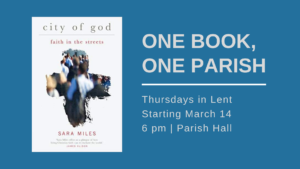City of God Study Guide Week 4
Lent 2019
Chapters 7-10
Prepared by the Rev. Ian Burch
St. Mark’s Episcopal Church | Milwaukee, WI
In chapter 7, the author spends some time talking about two neighbors–Geraldo and Thad. How are these two neighbors different, and how do they both make up the character of the Mission neighborhood? p.88-92
“In his parable of the Good Samaritan, Jesus makes God’s great commandment unequivocal: love God; love your neighbor. But like the lawyer who challenges him, I often wished to easel out of responsibility, hoping to calibrate who, precisely, was my neighbor.…” p. 94
- Have you ever wanted to pick and choose who gets to be your neighbor? Has there been a time when you felt cast out of the neighborhood?
“I’d never worn a cassock on my own block and felt ridiculous in it.” p. 96
- When was a time you were hesitant to share your faith? When was a time you were bold to share your faith?
The author spends a lot of time describing Don Miguel, the patriarch of the family next door, and the rest of the family living under his roof. What role does this story play in her larger narrative? Why does she spend so much ink space on the intimate lives of these neighbors? What lessons can we take from her care and interest in Don Miguel’s family? p. 97-104
“How do you really pay attention to what the Spirit is doing?”… “Oh, yeah, yeah, that’s the question,…” “…we don’t do it very well. God is happening all the time, but we focus on less important things.” p. 108
- The above quotes are part of a conversation between the author and Bertie, a priest. What do you think of Bertie’s comment that “we focus on less important things.” How has that been true or not true in your life?
“I mean, you keep on being a selfish jerk, but there’s a secret reservoir you can keep going back to, where you can see the Spirit praying within you.” p.111
- Have you ever been a selfish jerk? Have you ever seen the Spirit praying within you? What do you make of Bertie’s theology?
“…but what I thought of as my church life and my “real life” didn’t usually bump into each other so publicly.” p. 113
- Talk about the felt separation between church life and real life?
On 114-115, the author talks about reclaiming the language of sin and repentance. What comes up for you when you think about a project like this?
“It’s like that stupid Episcopal secret language…..” p.118
- The author has some choice words for insider language and gesture in the church. Talk about the conversation she has with Bertie about how to craft a liturgy with the needs of insiders and outsiders in mind. Do we do this here at St. Mark’s?
The last full paragraph on 122 is arresting in its main image of a woman kneeling in prayer on such secular ground. How did that image strike you?
P.126-128 Vera finds great comfort in the rituals of Ash Wednesday, even though it coincides with the death of her sister Audrey. What feelings or thoughts did you experience when you read that story and Vera’s response?
“In the street,” as Rosa Lee noted, “the Holy Spirit is working overtime. Reactions are coming out of you, and at you, from all directions. The breath of God is present in a different way–there’s no way to be jaded, it’s all new.” p.129
- Reflect on Rosa’s understanding of how the Holy Spirit works out in the streets of the city–particularly in public worship.
Reflect on the quote on page 130 that begins “All religious ritual…”
What do you make of the different arguments for offering Ash Wednesday liturgies inside the church vs outside the church? What of these arguments do you find most compelling and which arguments do you reject? p. 130
“All of them really loved the Church, even with its frequently neurotic demands for order.” p. 133
- This line cracked me up; is that ‘cause I’m a priest, or do you all feel like the Church can get neurotic about things too?
On pp. 134-136, the author spends time talking about a seeming tension between formal church and wild, subversive church. Do you feel a distinction between the two? She also plays with “a priest for the Church” vs “a priest for Jesus.” How do you hear those differences?
Reflect on the quote from Demetrios Constantelos that begins on p. 138, “It is the Spirit….”
“The good news of Ash Wednesday, the blessing so many people seek so fervently, comes from acknowledging the truth: that we are all going to die.” p. 139
- How does this quote strike you? True? False? Somewhere in between?
The author writes lyrically about the funeral for a young man named Chucho. How did the sequence strike you? What arose for you as you read pp. 141-143? “And Chucho with the resurrected Jesus–in heaven or whatever”
The author ends chapter ten with the story of the funeral of George. She ties together baptism, funerals, and Ash Wednesday. In what ways are these three things related to you? To the church?


Leave A Comment
You must be logged in to post a comment.